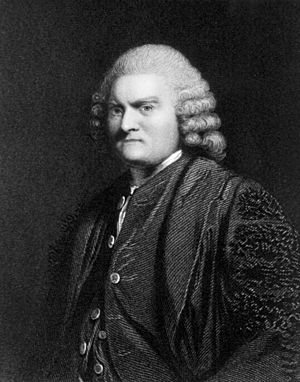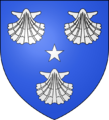Sir John Pringle, 1st Baronet facts for kids
Quick facts for kids
John Pringle
|
|
|---|---|
 |
|
| Born | 10 April 1707 |
| Died | 18 January 1782 (aged 74) London, England
|
| Nationality | Scottish |
| Alma mater | University of St Andrews |
| Known for | Antiseptics |
| Awards | Copley Medal (1752) |
| Scientific career | |
| Fields | Physician |
| 20th President of the Royal Society | |
| In office 1772–1778 |
|
| Preceded by | James Burrow |
| Succeeded by | Joseph Banks |
Sir John Pringle, 1st Baronet (born April 10, 1707 – died January 18, 1782) was a Scottish physician. He is often called the "father of military medicine" because of his important work. He made big changes in how soldiers were cared for during wartime.
Contents
Early Life and Education
John Pringle was born in Stitchel, Scotland. He was the youngest son in his family.
He went to several universities to study. He attended St Andrews University, Edinburgh University, and Leiden University. In 1730, he earned his degree as a Doctor of Physic from Leiden. There, he became good friends with other important thinkers like Gerard van Swieten.
After his studies, Pringle first worked as a physician in Edinburgh. From 1733 to 1744, he also taught Moral Philosophy at Edinburgh University.
A Pioneer in Military Medicine
In 1742, John Pringle became a doctor for the British army. He worked with the Earl of Stair, who led the army in Flanders.
During the Battle of Dettingen in 1743, Pringle made a huge difference. He talked with the French army's commander, Marshal of Noailles. They agreed that military hospitals should be safe places. This meant that sick and wounded soldiers from both sides would be protected. This idea was very new at the time. It helped lead to the International Red Cross and the modern Geneva Conventions. These rules protect people during war.
In 1744, Pringle was made the chief doctor for the British forces. He worked closely with the Duke of Cumberland. Later, in 1749, he moved to London. He became a personal doctor to the Duke of Cumberland.
In 1766, King George III made John Pringle a baronet. This was a special honor. In 1774, he became the King's own physician.
Pringle was also friends with Benjamin Franklin. They often traveled and had dinner together in London.
Important Scientific Work
John Pringle wrote many important books and papers. In 1750, he published Observations on the Nature and Cure of Hospital and Jayl Fevers. This book looked at diseases common in hospitals.
That same year, he wrote about his experiments on "septic and antiseptic substances." Septic means causing decay or infection. Antiseptic means preventing it. His work on these topics earned him the Copley Medal. This is a very important science award.
Two years later, in 1752, he published his most famous book. It was called Observations on the Diseases of the Army in Camp and Garrison. This book changed how military medicine was practiced. It helped make him known as the founder of modern military medicine.
Leading the Royal Society
In November 1772, Pringle was chosen to be the President of the Royal Society. This is a very old and respected scientific group in Britain. He held this important position until 1778. During his time as president, he gave many speeches about science.
Pringle was also a member of the Royal College of Physicians of Edinburgh starting in 1735. He was friends with James Burnett, Lord Monboddo, a Scottish philosopher.
John Pringle briefly returned to Edinburgh in 1780. But he came back to London in 1781 and passed away the next year.
Legacy
Sir John Pringle's work greatly improved medical care for soldiers. His ideas about protecting hospitals during war were groundbreaking. They still influence international laws today.
There is a monument to Pringle in Westminster Abbey in London. It was made by the artist Joseph Nollekens.
His personal papers are now open to the public. They are kept at the Royal College of Physicians of Edinburgh.
Images for kids
See also


